 |
Craig White's Literature Courses Historical Backgrounds
Afro-Caribbean identity
|
 Colin Powell , b. 1937 in Harlem to Jamaican immigrant parents (also Scottish ancestry); Chairman of Joint Chiefs of Staff, 1989-93; Secretary of State, 2001-2005. |
Most Afro-Caribbean peoples come to USA as immigrants seeking economic opportunity, but like New World Immigrants,
Like Mexican Americans and other Latinx-Americans, Afro-Caribbean immigrants to the United States find their identities in-between or mixed: is an Afro-Caribbean an immigrant or a minority?
The answer is provided not only by the individual or group but by the USA's dominant culture:
Does the Afro-Caribbean individual or family regard the USA as a land of fresh starts and equal opportunity (immigrant) or a nation with a long history exploiting other peoples and nations like their own? (minority)
When the USA's dominant culture sees an Afro-Caribbean, do its members see one of many immigrants voluntarily joining the USA's social contract of self-reliance and privilege, or do they lump the new arrival with the African American minority and its history of exploitation and unfairness?
Brief historical / geographical backgrounds:
![]() Afro-Caribbean nations = especially Haiti
and Jamaica, plus or minus . . .
Afro-Caribbean nations = especially Haiti
and Jamaica, plus or minus . . .
![]() smaller nations or islands like Antigua,
Virgin Islands, Barbadoes, St. Lucia, Trinidad, Guyana. (Most of these islands
or nations had at
least some British colonial influence, though Haiti was a French colony.)
smaller nations or islands like Antigua,
Virgin Islands, Barbadoes, St. Lucia, Trinidad, Guyana. (Most of these islands
or nations had at
least some British colonial influence, though Haiti was a French colony.)
People of African descent are in all the Caribbean and South America, but in Spanish-speaking and Portuguese-speaking countries, they may be identified as "Hispanic" instead of "Afro-Caribbean." (The Dominican Republic is the most African of Hispanic / Latino nations or peoples, but Brazil has the highest number of African-descended peoples in the Western Hemisphere or New World.)
The Caribbean is home to many multi-ethnic societies involving mixed descendants of native Indians, African slaves, European colonists, even Asian Indians (Hindus & Moslems). Some predictions of the USA's multi-ethnic future, especially in the South (e.g. New Orleans), West, and coastal cities, see Caribbean islands as a possible model or prototype.
(Not that the USA should necessarily imitate the Caribbean, but the Caribbean offers historical precedents for distinct but interactive populations of different appearances, cultures, and languages, often "mixed" in descent instead of "pure" as in American dominant-culture ideology.)

How do Afro-Caribbean immigrants vary from the immigrant narrative? (typical of New World Immigrants)
![]() Afro-Caribbeans
may move back and forth between home country and USA with more frequency than
"Old World Immigrants."
Afro-Caribbeans
may move back and forth between home country and USA with more frequency than
"Old World Immigrants."
![]() Improving communications and transportation may mean less
commitment to new country, more connections to old country > a bi-cultural
status?
Improving communications and transportation may mean less
commitment to new country, more connections to old country > a bi-cultural
status?
![]() (Marshall, "To Da-Duh":
351 ship that had brought us from New York)
(Marshall, "To Da-Duh":
351 ship that had brought us from New York)
Therefore this identity is somewhat in-between, or at least involves an influence against the "assimilation" model. In other words, if you remain connected to or identify with your home country, you're not assimilating according to the models of earlier Old-World immigrants who left their country far behind (with variations).
![]() New-World homelands aren't as far away as those of "model
minorities" like Jews and Asian Americans.
New-World homelands aren't as far away as those of "model
minorities" like Jews and Asian Americans.
![]()
Afro-Caribbean peoples as minorities?
![]() As with African Americans, Afro-Caribbeans' first contact
with the New World was through the involuntary contact of the slave ships,
followed by slavery's lack of economic opportunity.
As with African Americans, Afro-Caribbeans' first contact
with the New World was through the involuntary contact of the slave ships,
followed by slavery's lack of economic opportunity.
![]() Afro-Caribbeans have a somewhat different history from
African Americans (more below), but they share African descent and appearance.
Therefore, even though they may think of themselves as immigrants, native-born
Americans will often think of them as members of the black minority > "color
code."
Afro-Caribbeans have a somewhat different history from
African Americans (more below), but they share African descent and appearance.
Therefore, even though they may think of themselves as immigrants, native-born
Americans will often think of them as members of the black minority > "color
code."
![]() For instance, most people don't think of Colin Powell as
the son of immigrants but as an "African American," even though his
status as a Republican Secretary of State and a U.S. Army General of African descent
might suggest that he crosses
many
assumed categories. (Also he broke from the Republican party to support Barack
Obama.)
For instance, most people don't think of Colin Powell as
the son of immigrants but as an "African American," even though his
status as a Republican Secretary of State and a U.S. Army General of African descent
might suggest that he crosses
many
assumed categories. (Also he broke from the Republican party to support Barack
Obama.)
In brief, Afro-Caribbeans may follow the immigrant path, but they may feel pressure from whites and blacks and others to conform to the minority tradition.
By becoming associated with African Americans rather than with, say, Italian Americans or Irish Americans or Chinese Americans or Hispanic Americans, Afro-Caribbeans mix two stories: the immigrant story and the minority story.
![]()
One further complication: Note occasional leadership of African America by Afro-Caribbean immigrants:
politics: Marcus Garvey, Malcolm X, Louis Farrakhan, Colin Powell
arts and entertainment: Claude McKay, Harry Belafonte, Sidney Poitier
Afro-Caribbeans and African Americans sometimes show different personal-cultural styles, again owing to history.
African-descended people in Jamaica, Haiti, and other Afro-Caribbean nations are in the majority. They're used to running things with other people of color in leadership positions.
African American people of USA may be assertive and enterprising, but they're never used to being in the majority.
Outcome:
Afro-Caribbeans and African Americans will sometimes cross each other or rub each other wrong, but they also often intermarry. (The father of one of this course's African American students was from the Caribbean; she quoted him as saying, "They only see your color.")
African Americans may see Afro-Caribbeans as bossy, overbearing, or failing to appreciate the disadvantages African Americans have labored under.
Afro-Caribbeans may criticize African Americans as not rising to economic opportunity. (In other words, Afro-Caribbeans may criticize African Americans for not acting like immigrants!)
Conclusion:
People, nations, groups are shaped by history. Race can be a part of that history and can shape and reshape stories told by immigrants . . .
![]()
Afro-Caribbean peoples as immigrants?
Immigration and trade between black Caribbean colonies and nations and North America or USA have been ongoing for centuries. (Recently dramatized in Hamilton)
Some prominent figures in Black American History (USA) are of Caribbean descent:
Marcus Garvey (1887-1940), "Pan-Africa" political and economic leader in New York City in 1910s-20s was Jamaican.
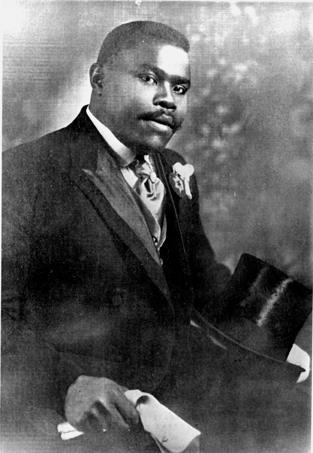 Marcus Garvey (1887-1940) |
"Poets in the Kitchen" p. 84: "If FDR was their hero, Marcus Garvey was their God. The name of the fiery, Jamaican-born black nationalist of the twenties was constantly invoked around the table. For he had been their leader when they first came to the United States from the West Indies shortly after World War I." |
![]()
| Poetry by Claude McKay (1890-1948) from Jamaica is usually regarded as initiating the "Harlem Renaissance" of African American Literature in the 1910s and 20s. |
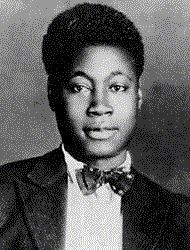 |
![]()
20th century Afro-Caribbean culture leaders in USA
Entertainers / activists like Harry Belafonte (childhood in Jamaica) and Sidney Poitier (the Bahamas).
![]() Colin Powell (parents from Jamaica)
Colin Powell (parents from Jamaica)
![]() Louis Farrakhan of Black Muslims (mother from St. Kitts)
Louis Farrakhan of Black Muslims (mother from St. Kitts)
![]() Malcolm X's mother was from
Grenada in the British West Indies.
(Malcolm's father was a follower of Marcus Garvey)
Malcolm X's mother was from
Grenada in the British West Indies.
(Malcolm's father was a follower of Marcus Garvey)
![]() Tim Duncan of the San Antonio Spurs is from St. Croix, U.
S. Virgin Islands (constantly praised for his "quietness" and his
"work ethic"—begins to sound like a
"model minority" or
immigrant values)
Tim Duncan of the San Antonio Spurs is from St. Croix, U.
S. Virgin Islands (constantly praised for his "quietness" and his
"work ethic"—begins to sound like a
"model minority" or
immigrant values)
![]() Adonal Foyle,
former basketball player for Golden State Warriors, voting rights activist, b. 1975 on Caribbean Islands of
St.
Vincent and the Grenadines.
Adonal Foyle,
former basketball player for Golden State Warriors, voting rights activist, b. 1975 on Caribbean Islands of
St.
Vincent and the Grenadines.
Point: Afro-Caribbean immigrants sometimes make a leading contribution to American and African American cultures—possibly because their leadership develops in a different historical background involving majority-black homelands.
Summary of Afro-Caribbean peoples as immigrants: Most Afro-Caribbeans come to the USA as immigrants seeking economic opportunity and therefore fit the immigrant narrative as far as that goes.
But, like other New World immigrants, they're in-between or mixed in terms of immigrant & minority identity . . .
![]()

![]()
African American populations originally concentrated in "Deep South" states of USA and in Caribbean. As one goes further North and West, original African American populations were smaller.
Economic Reasons: large-scale plantations
in Deep South and Caribbean supplied growing commodities markets for sugar,
coffee, rubber, cotton, & more.
Slave plantations as early phase of
industrial-consumer culture: "Naked Capitalism" in which property rights and
development outweigh human rights and development.
One reason the triangular trade worked for so long is that slaves' years of life after arriving in the Americas were mostly in single-digits, so plantations needed a constant supply of fresh human labor, much as modern economies now need constant supplies of fossil fuels from earth's past.
![]()
Other leading contemporary Afro-Caribbean writers
Derek Walcott, b. 1930 St. Lucia, poet and playwright, won Nobel Prize for Literature in 1992
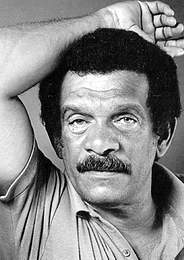
Jamaica Kincaid, b. 1949, Antigua and Barbuda, controversial but exciting novelist and memoirist
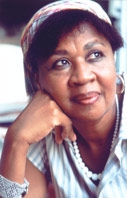

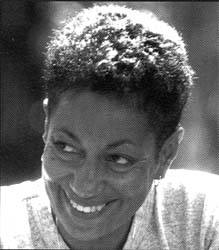

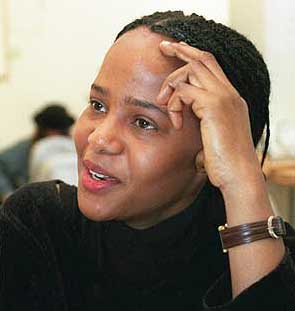
Afro-Caribbean Women Writers: Paule Marshall, June Jordan, Jamaica Kincaid, Edwidge Dandicat
Afro-Caribbean Musicians (many more)
|
|
|
"Talent is universal; opportunity is not."
--Rye Barcott, It Happened on the Way to War (2011)

